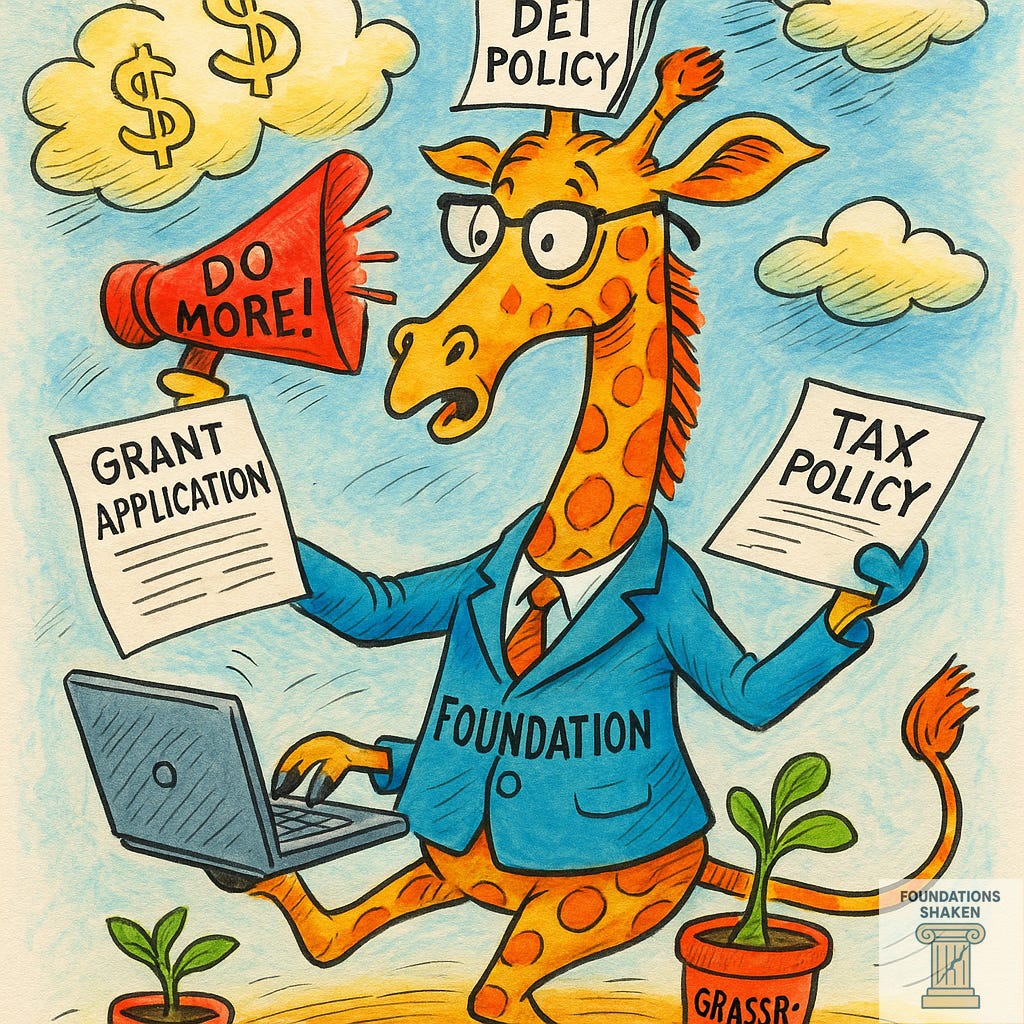In his 1972 work The Big Foundations, Waldemar Nielsen characterized foundations “Like the giraffe, they could not possibly exist, but they do.” (p. 3). Foundations are strange creatures. They don’t quite fit into our usual ideas of how institutions should work. But even more: we don’t always know what we expect them to be. A safety net? A catalyst? A quiet partner? The giraffe comparison captures that confusion: awkward, improbable, yet undeniably present.
This post is a light-hearted, yet research-informed reflection on the contradictory and cumulative demands placed on philanthropic foundations today. Drawing from recent commentary and news sources, I conducted a review of public discourse to identify the most common expectations voiced toward foundations, whether regarding equity, transparency, political advocacy, or trust-based giving.
Foundations often receive criticism, which is understandable given their influence, but the broader philanthropic field tends to avoid the same level of scrutiny. It’s a sensitive space, with field-builders and intermediaries launching various efforts, which can make the overall message feel somewhat unclear.
I often find myself wondering: am I, as an individual donor, subject to such intense opinion on what I should give to or how I should do so? I’m not as wealthy as a foundation, or am I? As someone with a PhD in philanthropy and a career advising others, I’m supposed to have my giving figured out. But what if I don’t?
I invited generative AI (ChatGPT) to collaborate with me in shaping this inventory into a Dr. Seuss–style poem. I see this post as a poetic inventory of all the things we tell foundations to do. With a giraffe in a blazer, of course.
Oh, the Things Foundations Must Do!
A poem, with thanks to recent headlines and conflicting advice
Oh my, the noise! The shoulds! The musts!
The calls to give, to shift, to trust!
I've watched and wondered, have you too?
Do we ask one thing, then the other to do?
So I scraped the news, the blogs, the feeds,
To track the trends, the wants, the needs.
And built this rhyme for your review,
To weigh the list we give them to do.
In the land of the grants, where the funders convene,
Foundations are told to be lean and be green.
"Give swiftly!" they shout, "No time to delay!"
"Spend down your endowments without much dismay."
"Be trustful!" they urge, "Let grantees lead the way!
Unrestricted funds are the order today!"
"Embrace equity, justice, and DEI too,
But beware of the politics shadowing you.”
"Collaborate broadly, don’t go it alone,
Support local newsrooms and build up their tone!"
"Adapt to the times, be agile and spry,
Yet maintain your mission, reach for the sky."
"Resist new taxes that come into play,
Advocate fiercely, don’t give it away!"
"Stand firm in your values, be bold and be wise,
But avoid any actions that might polarize."
"Support the grassroots, let communities steer,
But ensure that your metrics remain crystal clear."
"Be innovative, forward, yet cautious in pace,
Align with the trends, but keep your own space."
"Don’t grow too big!" "Don’t stay too small!"
"Scale what works - but not at all!"
"Fund systems change!" "But measure each grant!"
"Don’t give with ego!" "Don’t say you can’t!"
And though they are told to go do it all,
To rise and to pivot, to shrink and grow tall…
Let’s pause for a moment and ask what is true:
Could we meet these demands if they came to you?
We mustn’t show pity - foundations are grand!
With assets and gatekeepers waving their hand.
But inside those towers, with views and with plans,
Are humans with inboxes, doing the best that they can.
So here is the list, conflicting, it's true;
Of all the great things that funders must do.
A tangle of guidance, both earnest and loud,
That pulls them in circles, lost in a cloud.
It’s not an excuse, just something to hold,
As we shape our critiques, and grow brave and bold.
Because changing the world, with thought and with care,
Is easier said than done, anywhere.
Nielsen, W. A. (1972). The big foundations. Columbia University Press.






Indeed. And the point is that we are all looking to these sad bastions of historical wealth and privilege - or the current billionaire corporate ethical wastelands, or individuals who barely have enough for themselves, to solve a problem only system change can solve. Not the systems within philanthropy - the system of philanthropy itself.